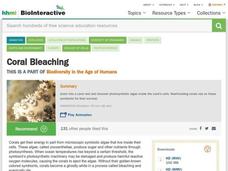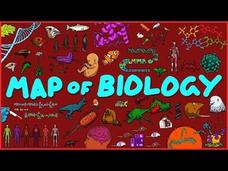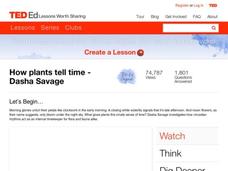Natural History Museum
We need to talk about green energy | Live Talk with NHM Scientist
Green energy promises a guilt-free future. But like all technology, it’s dependent on metals and minerals from Earth. Where do we find these resources? Would you live next to a mine if it made your life greener? Join science communicator...
Natural History Museum
What do fossils tell us about animal behaviour? | Live Talk with NHM Scientist
What would it be like to see prehistoric animals as they lived and breathed? Fossils are not just inanimate objects. They can record the life stories of creatures as fully alive as any today, from mammoths fighting to their deaths to...
Natural History Museum
What are lichens and why are they important? | Live Talk with NHM Scientist
Although lichens are everywhere, these bizarre and complex life forms tend to be overlooked. They are the result of symbiotic relationships between algae and fungi, and they come in a wonderful variety of colours, shapes and sizes. Join...
Natural History Museum
Can we sequence the DNA of all UK species? | Live Talk with NHM Scientist
More than ever, it is critical that we preserve the diversity of life on our planet. Join us as we explore an ambitious project to sequence the genomes of every single species living in the UK. How do we hope to achieve this goal, and...
Natural History Museum
How can fossils help us predict future climate change? | Live Talk with NHM Scientist
Carbon dioxide in the Earth's atmosphere is rising at an alarming rate. The last time levels were this high was in the Pliocene epoch over 3 million years ago. What can studying fossilised marine organisms tell us about the conditions...
Natural History Museum
Trapped on the ice | Live talk with NHM scientist
When the global Covid-19 pandemic hit, Museum PhD student Jaz Millar was in one of the most remote and inhospitable regions on Earth – Antarctica. Jaz was researching microscopic life in Antarctica when news reached them that the rest of...
Natural History Museum
Meet a Wildlife Photographer Jennifer Hayes | Live Talk with NHM Scientist
This year's incredible Wildlife Photographer of the Year Competition added brand new category, Oceans - the bigger picture, shining a spotlight on the importance of marine environments for our planet. Join Alison Shean for an exclusive...
Natural History Museum
What can you find on a sky island? | Live Talk with NHM Scientist
High above the surrounding landscape, isolated mountains can create unique environmental conditions and become “sky islands”. Join Khalil Thirlaway in conversation with Philippe Kok, who has devoted his life to studying and exploring...
Natural History Museum
A-dressing the future of fashion | Lates Online
Over 85% of all textiles end up in landfill each year. With the global population buying and discarding clothes more than ever before, the fashion industry's toll on the planet has never been greater. In the continuous race for cheaper...
Seeker
Inside NASA’s Race Back To Neptune’s Icy Moon
Could Neptune’s moon, Triton, harbor life? NASA scientists are working on a mission concept that after 30 years could finally return us back to this icy world. Watch more Focal Point! | https://bit.ly/2WvQRBt Read More: Next Stop,...
Institute for New Economic Thinking
Yvo Desmedt: Much Ado About Cyber Security
Private data is leaked more and more in our society. Wikileaks, Facebook, and identity theft are just three examples. Network defenses are constantly under attack from cyber criminals, organized hacktivists, and even disgruntled...
Veritasium
Do Aliens Exist?
Many people believe in aliens, but what does the science say about life on another planet? Part of a larger series, an interesting video discusses the concept with people on the street and scientists, finding vastly different answers. It...
Physics Girl
How Do Touchscreens Work?
Why can't we text when wearing wool gloves? The narrator explains the science behind touchscreens as part of a larger physics series. From sensors to translation, the complex process of sending a simple emoji comes to life.
Howard Hughes Medical Institute
Coral Bleaching
What is coral bleaching? Tackle a trendy topic with a narrated animation. Through a combination of video and illustration, the narrator introduces viewers to a coral reef, then goes inside a coral polyp to show its symbiotic relationship...
TED-Ed
How to Master Your Sense of Smell
Get in touch with your sense of smell! The author of the video provides three simple steps to help you get the best of the smells around you: get close to it, inhale a few sniffs, and notice smells around you.
Domain of Science
The Map of Biology
Many define biology as the study of life but can't agree on a definition of life. Trying to explain all of the domains and subdomains of biology seems a bit easier than defining life. See a full map of the topics covered by the general...
Bozeman Science
Ecological Succession
Never trust a tree, they always look shady. The video explains both primary and secondary succession. It uses examples of volcanic activity, fires, and human disturbances. It is the seventh in an 18-part series.
Curated OER
Giant Centipede
Want to get up close and personal with a giant centipede? Watch this video and you will! Learn about the giant centipede's daily living habits in this National Geographic video clip.
Crash Course
Lab Techniques and Safety
Lab safety, lab safety, lab safety: you can't say it enough! A video demonstrates the essentials for being safe whether in a chemical or biological lab. Learn the techniques to keep you and your classmates safe all year, from activity...
Teach Engineering
Storing Android Accelerometer Data: App Design
There's an app for that! Pupils learn to build an app that will store data on an Android. The lesson introduces class members to the tiny database, TinyDB, for Android devices. A video tutorial provides an example that uses the TinyDB in...
TED-Ed
How Plants Tell Time
Can someone really have a "biological clock"? Discover why many organisms on earth have an inherent awareness of where they are in the day's cycle.This video discusses animal adaptations, the earth's revolutions, and how light and...
California Academy of Science
Think Before You Eat
Small changes in individual diets add up quickly, which is the theme of the ninth lesson in the 13-part Our Hungry Planet unit. Viewers watch a video to learn basic facts before reading a handout and discussing their own choices.
SciShow
The Chemistry of Addiction
Why are addictions so common? A video explains the biological processes associated with addiction and the evolutionary reasons we respond this way. It focuses on the brain and chemical responses. It also explores the links between...
Kurzgesagt – In a Nutshell
The Antibiotic Apocalypse Explained
Antibiotic resistance encompasses one of the world's most pressing public health problems. The video explains how antibiotics work and why humans are becoming resistant to them. It expands on the idea of antibiotic resistance and options...

























